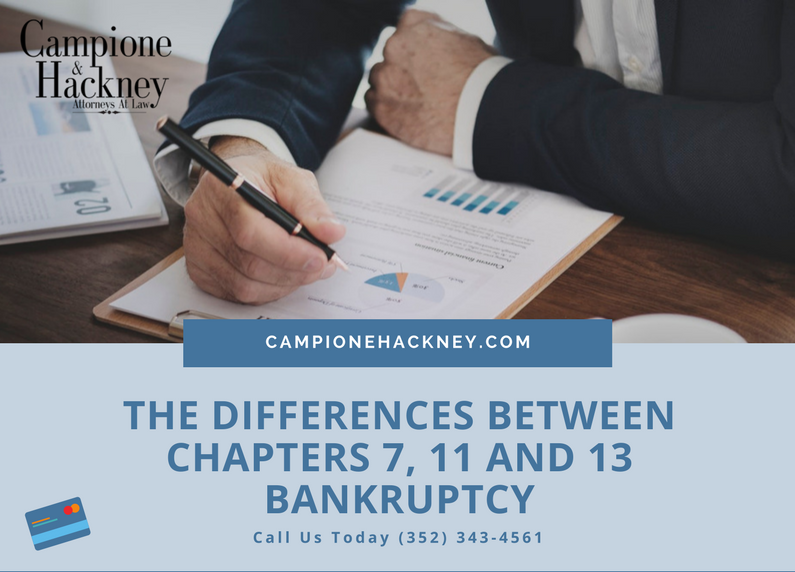If you’re drowning in debt and are on the brink of losing your hard-earned assets, filing bankruptcy may be the solution to your problems.
Get Help from an Experienced Bankruptcy Lawyer Lake County Florida
The type of bankruptcy you file, however, can make a difference in what you get to keep – or give up.
Bankruptcy is an umbrella term for a legal process used to solve debt, either through:
The Liquidation of Assets and/or Asset Protection
There are several ways one can file bankruptcy, and a lawyer who specializes in this niche is the best person to review your case, to determine if it’s best to file:
- Chapter 7 Bankruptcy
- Chapter 11 Bankruptcy
- Chapter 13 Bankruptcy
Dissolve Debt with a Bankruptcy Lawyer Lake County Florida
Though all bankruptcy filings share the common goal of dissolving debt, there are different eligibility requirements for each.
Additionally, each bankruptcy type has various pros and cons.
In this post, Campione & Hackney briefly describes the main differences between three main types of bankruptcy:
Chapter 7 Bankruptcy – Liquidation Bankruptcy
In Chapter 7 Bankruptcy, unsecured debts are resolved by selling the debtor’s nonexempt assets. Whatever monies are made is redirected to creditors. In these cases, a court-appointed executor handles the sale of assets and repayment activities.
Eligibility Requirements – Limited or No Disposable Income
To determine eligibility, a Chapter 7 Means Test is completed. Chapter 7 Bankruptcy can also be filed by both individuals and businesses.
Cons
Unlike Chapter 13 bankruptcy, there is no leeway to extend payment dues.
Chapter 13 Bankruptcy – An Opportunity to Regroup
If you earn a consistent and/or substantial income and want to file bankruptcy, you may not pass the Chapter 7 Means Test discussed earlier.
In this event, or when you intend to postpone the seizure of assets, a Chapter 13 bankruptcy is more feasible.
Unlike Chapter 7 bankruptcy where all nonexempt assets must be sold to repay debt, the filer gets the chance to keep all assets – and avoid the possibility of foreclosure or repossession, for example.
Eligibility Requirements – Steady Income
Cons
What’s the catch, you may ask?
Filing Chapter 13 bankruptcy comes with a repayment plan. A bankruptcy lawyer Lake County Florida, such as Campione & Hackney, can usually provide estimates to help you gauge if this is the right choice for your needs.
Another note to keep in mind is that Chapter 13 bankruptcy is available to individuals only.

Chapter 11 Bankruptcy – A Focus on Business
We explored Chapter 11 bankruptcy last, because it focuses mainly on businesses who intend to stay afloat and get a chance to reorder finances – i.e. in the face of mounting debts.
This type of bankruptcy provides many advantages that Chapter 7 and 13 can’t. For example:
- In Chapter 7: Business Can’t Keep Assets
- In Chapter 13: Income Requirements Come into Play
Eligibility Requirements – Little to None
Cons
In Chapter 11 Bankruptcy, anyone and any business can file. The downside, however, is that it generally takes longer and costs more to complete.
Get Sound Answers and Clear Direction
bankruptcy, there is a lot of variables to keep in mind.
In times of financial distress, you need a sound advisor and legal team – on your side. For clear direction on which route to take, call Campione & Hackney in Lake County Florida at (352) 343-4561.

